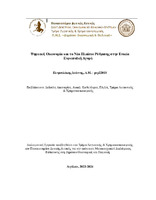| dc.contributor.advisor | Δεδούλη, Αικατερίνη | |
| dc.contributor.author | Πετρουλάκης, Ιωάννης | |
| dc.date.accessioned | 2024-06-27T08:20:39Z | |
| dc.date.available | 2024-06-27T08:20:39Z | |
| dc.date.issued | 2024-06-11 | |
| dc.identifier.uri | https://polynoe.lib.uniwa.gr/xmlui/handle/11400/6913 | |
| dc.identifier.uri | http://dx.doi.org/10.26265/polynoe-6748 | |
| dc.description.abstract | Στη σύγχρονη εποχή, η έννοια της «Ψηφιακής Οικονομίας» και των επιμέρους αγορών της, τείνει να ταυτιστεί με το σύνολο της Οικονομίας, δημιουργώντας προκλήσεις και ευκαιρίες για την Ενιαία Ευρωπαϊκή Αγορά. Πολυεθνικές εταιρίες με ισχύ κοινωνική, οικονομική, τεχνολογική διαμορφώνουν τους δικούς τους κανόνες λειτουργίας, ωθώντας την Ευρωπαϊκή Επιτροπή να εξετάζει συνεχώς τις εμπορικές τους στρατηγικές, με στόχο την αποφυγή πρόκλησης εμποδίων στον ελεύθερο και δίκαιο ανταγωνισμό. Παράλληλα η νομολογία και οι αποφάσεις των οργάνων της Ένωσης έχουν συνέπειες και πέραν των ευρωπαϊκών συνόρων, επηρεάζοντας εμμέσως το πλαίσιο του δίκαιου του ανταγωνισμού και σε τρίτες χώρες. Η εργασία μελετάει τους τρόπους ρύθμισης των ψηφιακών αγορών βάσει των άρθρων 101 και 102 της ΣΛΕΕ, ειδικότερα το νομικό εργαλείο της Κατάχρησης Δεσπόζουσας Θέσης τη θεμελίωση και τις επιπτώσεις του. Επιπλέον αξιοποιεί τα συμπεράσματα των Αποφάσεων της Ευρωπαϊκής Επιτροπής και του Γενικού Δικαστηρίου για να αναδείξει το νέο κανονιστικό πλαίσιο, τον Κανονισμό «Digital Markets Act». Αξιολογεί το συνολικό ρυθμιστικό πλέγμα και παρουσιάζει τις διαφορές αντιμετώπισης του ανταγωνισμού στις ΗΠΑ, Κίνα και Ινδία. Η έρευνα καταδεικνύει ότι η Ε.Ε. χτίζει νέα εργαλεία ρύθμισης, αντλώντας από τα συμπεράσματα των σχετικών νομικών υποθέσεων της περιόδου 2000-2022, προωθώντας την ίση μεταχείριση, τη διαλειτουργικότητα και την ελευθερία των χρηστών έναντι αθέμιτων εμπορικών πρακτικών, με την σκέψη ότι οι τεχνολογικές εξελίξεις επιταχύνονται και η τεχνολογική δύναμη της αξιοποίησης των δεδομένων, μοιάζει να συσσωρεύεται σε λίγες ισχυρές εξω-ενωσιακές εταιρίες. | el |
| dc.format.extent | 113 | el |
| dc.language.iso | el | el |
| dc.publisher | Πανεπιστήμιο Δυτικής Αττικής | el |
| dc.rights | Αναφορά Δημιουργού - Μη Εμπορική Χρήση - Παρόμοια Διανομή 4.0 Διεθνές | * |
| dc.rights.uri | https://creativecommons.org/licenses/by-nc-sa/4.0/deed.el | * |
| dc.subject | Ευρωπαϊκή Ένωση | el |
| dc.subject | Ευρωπαϊκή Επιτροπή | el |
| dc.subject | Ψηφιακή οικονομία | el |
| dc.subject | Κατάχρηση δεσπόζουσας θέσης | el |
| dc.subject | Άρθρα 101-102 | el |
| dc.subject | Ανταγωνισμός | el |
| dc.subject | Ψηφιακές αγορές | el |
| dc.subject | Microsoft | el |
| dc.subject | Google | el |
| dc.subject | Amazon | el |
| dc.subject | Apple | el |
| dc.subject | Digital Markets Act | el |
| dc.subject | European Union | el |
| dc.subject | European Commission | el |
| dc.subject | Digital economy | el |
| dc.subject | Abuse of dominant position | el |
| dc.title | Ψηφιακή οικονομία και το νέο πλαίσιο ρύθμισης στην ενιαία ευρωπαϊκή αγορά | el |
| dc.title.alternative | Digital economy and the new regulatory framework in the single european market | el |
| dc.type | Μεταπτυχιακή διπλωματική εργασία | el |
| dc.contributor.committee | HYZ, ALINA | |
| dc.contributor.committee | STAMATOPOULOS, Theodoros | |
| dc.contributor.faculty | Σχολή Διοικητικών, Οικονομικών & Κοινωνικών Επιστημών | el |
| dc.contributor.department | Τμήμα Λογιστικής και Χρηματοοικονομικής | el |
| dc.contributor.master | Δημόσια Οικονομική και Πολιτική | el |
| dc.description.abstracttranslated | In modern times, the concept of the "Digital Economy" and its relevant markets tends to be identified with the entire economy, creating challenges and opportunities for the Single European Market. Multinational companies with social, economic and
technological power shape their own rules of operation, prompting the European Commission to constantly examine their commercial strategies, with the aim of avoiding obstacles to free and fair competition. At the same time, case-law and decisions of the EU institutions have consequences beyond European borders, indirectly affecting the framework of competition law in third countries as well. The paper studies the ways of regulating digital markets under Articles 101 and 102 TFEU, in particular the legal tool of Abuse of Dominant Position, its foundation and implications. In addition, it utilizes the conclusions of the Judgments of the European Commission and the General Court to highlight the new regulatory framework, the Regulation "Digital Markets Act". It
evaluates the overall regulatory grid and presents the differences in the treatment of competition in the US, China and India. The research shows that the EU is building new regulatory tools, drawing on the conclusions of the relevant legal cases of 2000-2022,
promoting equal treatment among enterprises, application and software interoperability and freedom of users against unfair commercial practices, thinking that technological developments are accelerating and the technological power of data exploitation seems to be accumulating in a few powerful non-EU companies. | el |


